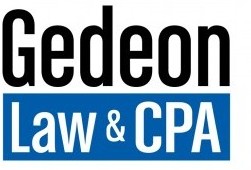What would the New Year be without a new set of tax rules? Well, Congress didn’t disappoint this year and as most of you know, Congress recently approved, and President Obama signed legislation, that averted the fiscal cliff arising from the expiration of the Bush era tax cuts that were set to expire at midnight on December 31, 2012.
At Gedeon Law & CPA, we’ve been combing over the new legislation to identify the major tax provisions that will impact our clients. While the wealthy will undoubtedly shoulder the biggest tax burden under the new legislation, all taxpayers will see some kind of tax increase in 2013.
We’ve put together a quick summary of the highlights from the new legislation that we think are most notable to our clients.
Income Tax Rates
The new law permanently extends most of the individual lower income tax rates for unmarried taxpayers with income of $400,000 or less and married taxpayers with income of $450,000 or less.
On the other hand, the new law permanently sets the top marginal tax rate at 39.6 percent (up from 35 percent in 2012) for unmarried taxpayers with income over $400,000 and married taxpayers with income over $450,000.
Capital Gains Rates
The new law sets the top rate on income from capital gains and qualified dividends at 20 percent (up from 15 percent in 2012) for unmarried taxpayers with income over $400,000 and married taxpayers with income over $450,000. The new Medicare surtax will boost the rate to 23.8%.
For all other taxpayers, the 15% rate still applies and taxpayers in the 10% or 15% tax bracket can still qualify for the special 0% rate.
Personal Taxes
A 0.9% Medicare surtax on earned income has been introduced for high-income earners in 2013. The surtax applies to wages as well as to self-employment income. Singles and heads of household will owe it once total earnings exceed $200,000 while married couples are subject to the tax on earnings over $250,000. Therefore, for earnings over the thresholds, the effective Medicare tax rate will be 3.8% – the current 2.9% rate plus an extra 0.9%. The surtax applies only to the employee’s share of Medicare tax, not the employer’s. Employers will withhold the surtax once an employee’s wages exceed $200,000 and employees will then calculate the actual tax due on their Form 1040.
The 3.8% Medicare surtax on net investment income also begins this year. It applies to unearned income of single taxpayers and heads of household who have modified adjusted gross incomes (AGI) above $200,000 and married couples with modified AGIs over $250,000. This surtax is levied on the smaller of thetaxpayer’s net investment income or the excess of modified AGI over the applicable dollar threshold. Investment income includes interest, dividends, capital gains, annuities, royalties and passive rental income. Tax free interest is exempted, along with payouts from retirement plans such as 401(k)s, IRAs, deferred pay plans and pension plans.
The Social Security wage base rises this year to $113,700, a $3,600 boost. Moreover, social security tax rates are higher as the employee contribution rate reverts back to 6.2% with thereduced 4.2% rate expiring at the end of 2012.
Itemized Deductions
High-income earners will lose some of their itemized deductions for 2013. Their itemized deductions will be slashed by 3% of the excess of AGI over $250,000 for singles, $275,000 for household heads and $300,000 for married couples. However, the total reduction can’t exceed 80% of itemized deductions (which we don’t see as being relevant to most taxpayers). The good news is that medical expenses, investment interest, casualty losses and gambling losses (to the extent of winnings) are exempted from this cutback.
Personal Exemptions
Personal exemptions will increase to $3,900 in 2013. But this write-off is phased out for high-income earners. It is cut by 2% for each $2,500 of AGI over the same thresholds for the itemized deduction phase-out.
Medical Expenses
The threshold for deducting medical expenses on Schedule A jumps to 10% of AGI for singles and married couples under age 65, unless at least one of the taxpayers is age 65 or older. If so, they still get the 7.5%-of-AGI threshold
Health Savings Accounts
The annual ceiling on deductible payments to health savings accounts increases in 2013. The maximums are $6,450 for account owners with family medical coverage and $3,250 for single coverage. The limitations on out-of-pocket expenses, such as deductibles and copayments, increases to $12,500 for those with family coverage and $6,250 for single coverage. Minimum policy deductibles increase to $2,500 for families and $1,250 for individuals.
Flexible Health Spending Accounts
Contributions to flexible health spending accounts are now capped at $2,500 with the limits on deducting long-term-care premiums marginally higher, ranging from $4,550 per person for taxpayers who are age 71 or older, to $360 per person for people age 40 and younger.
Retirement Contributions
The maximum 401(k) contribution is $17,500 this year while the 2013 limits for traditional and Roth IRAs will increase to $5,500.
Tax Breaks for Businesses and Individuals
Individuals will continue to take advantage of the income tax exclusion on up to $2 million of forgiven home mortgage debt in 2013.
Businesses will also continue to benefit from the 50% bonus depreciation for certain assets placed in use in 2013. This break can be claimed on new assets that have useful lives of 20 years or less.
Businesses can also continue to write off up to $500,000 of business assets as an expense. The $500,000 ceiling is reduced dollar for dollar after more than $2 million of assets are put in service.
Employers can still take advantage of credits like the Work Opportunity Tax Credit and the Returning Heroes Tax Credits for hiring qualified veterans.
Employers can still provide educational assistance, including undergraduate and graduate education, of up to $5,250 per year that is excluded from income and employment taxes.
Estate Taxes
The estate and gift tax exemption for 2013 increases to $5,250,000, however, the estate tax rate jumps to 40%. The annual gift tax exclusion rises to $14,000 per donee.
Gedeon Law & CPA is committed to assisting individuals and businesses with reviewing and planning for the tax changes resulting from rapidly evolving legislation. Please contact our office if you have any questions regarding how our services can benefit you.



